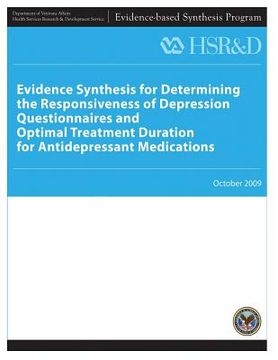Compartir
Evidence Synthesis for Determining the Responsiveness of Depression Questionnaires and Optimal Treatment Duration for Antidepressant Medications (en Inglés)
Health Services Research Service
(Autor)
·
U. S. Department of Veterans Affairs
(Autor)
·
Createspace Independent Publishing Platform
· Tapa Blanda
Evidence Synthesis for Determining the Responsiveness of Depression Questionnaires and Optimal Treatment Duration for Antidepressant Medications (en Inglés) - Service, Health Services Research ; Affairs, U. S. Department of Veterans
S/ 110,94
S/ 184,89
Ahorras: S/ 73,96
Elige la lista en la que quieres agregar tu producto o crea una nueva lista
✓ Producto agregado correctamente a la lista de deseos.
Ir a Mis Listas
Origen: Estados Unidos
(Costos de importación incluídos en el precio)
Se enviará desde nuestra bodega entre el
Viernes 19 de Julio y el
Martes 30 de Julio.
Lo recibirás en cualquier lugar de Perú entre 2 y 5 días hábiles luego del envío.
Reseña del libro "Evidence Synthesis for Determining the Responsiveness of Depression Questionnaires and Optimal Treatment Duration for Antidepressant Medications (en Inglés)"
According to projections from the World Health Organization, depression will be the second leading cause of disability in the developed world by 2020. Primary care clinicians (PCCs) care for approximately two thirds of depressed individuals. Rates of guideline concordant care for depression, however, are suboptimal and patient outcomes are often poor. A variety of strategies have been tested to improve patient outcomes including: physician education, continuous quality improvement, and reorganizing care to integrate mental health and primary care. Of these approaches, integrated care models have been found to be both effective and cost effective. A recent analysis using meta-regression techniques identified baseline and follow-up assessments of depressive symptoms with a standardized scale as critical components of successful integrated models. Patients randomized to integrated care are more likely to receive an adequate trial of antidepressants and/or empirically based psychotherapies and are approximately twice as likely to respond to treatment compared to usual care. Much like serial monitoring of Hemoglobin A1c in patients with diabetes, careful symptom assessment through standardized depression scales may facilitate treatment changes that improve outcomes. However, the review did not identify the standardized scales that are responsive to clinically important change. A second issue relevant to the primary care management of depression is the optimal duration of antidepressant medication. For patients who remit with treatment, the benefits of sustained antidepressant medication to prevent relapse or recurrence must be balanced against the risks. Early clinical guidelines recommended 4-6 months of continuation phase treatment for uncomplicated major depression due to high rates of early relapse and demonstrated efficacy of continuation treatment. Maintenance phase treatment is recommended for patients at high risk for recurrence. More recently, some guidelines have recommended longer duration of continuation phase treatment despite emerging evidence about potential long-term adverse effects including gastrointestinal bleeding and osteoporosis. The duration of antidepressant medication treatment not only has important implications for individual patients, but also has cost implications that include the direct cost of medication, longitudinal monitoring and treatment of adverse effects. To inform recommendations for clinical guidelines and potential performance measures, this evidence synthesis evaluates the responsiveness of depression questionnaires feasible for primary care settings and data from randomized trials that examine the effects on continued antidepressant use to prevent relapse or recurrence. The Key Questions (KQ) were: KQ1: In patients with major depressive disorder treated in primary care settings, what assessment tools are responsive to change? This review should specifically address instruments that are feasible for the primary care setting. KQ2: In primary care patients with major depressive disorder who remit with antidepressant medication, what is the minimum treatment duration to decrease the risk of relapse or recurrence? This review will focus on patients without comorbid substance abuse, PTSD, psychosis or other conditions where guidelines would recommend specialty based care.

